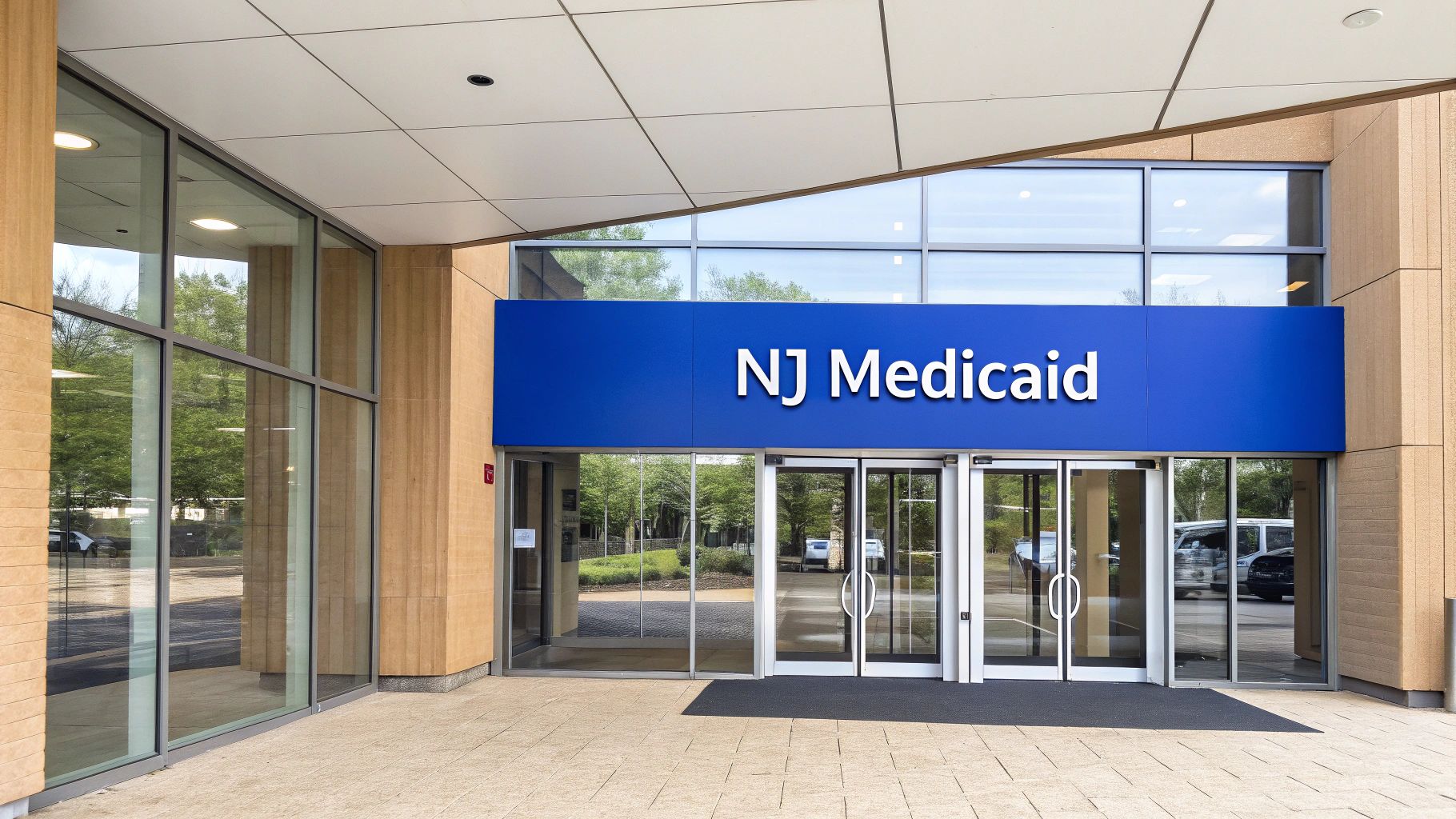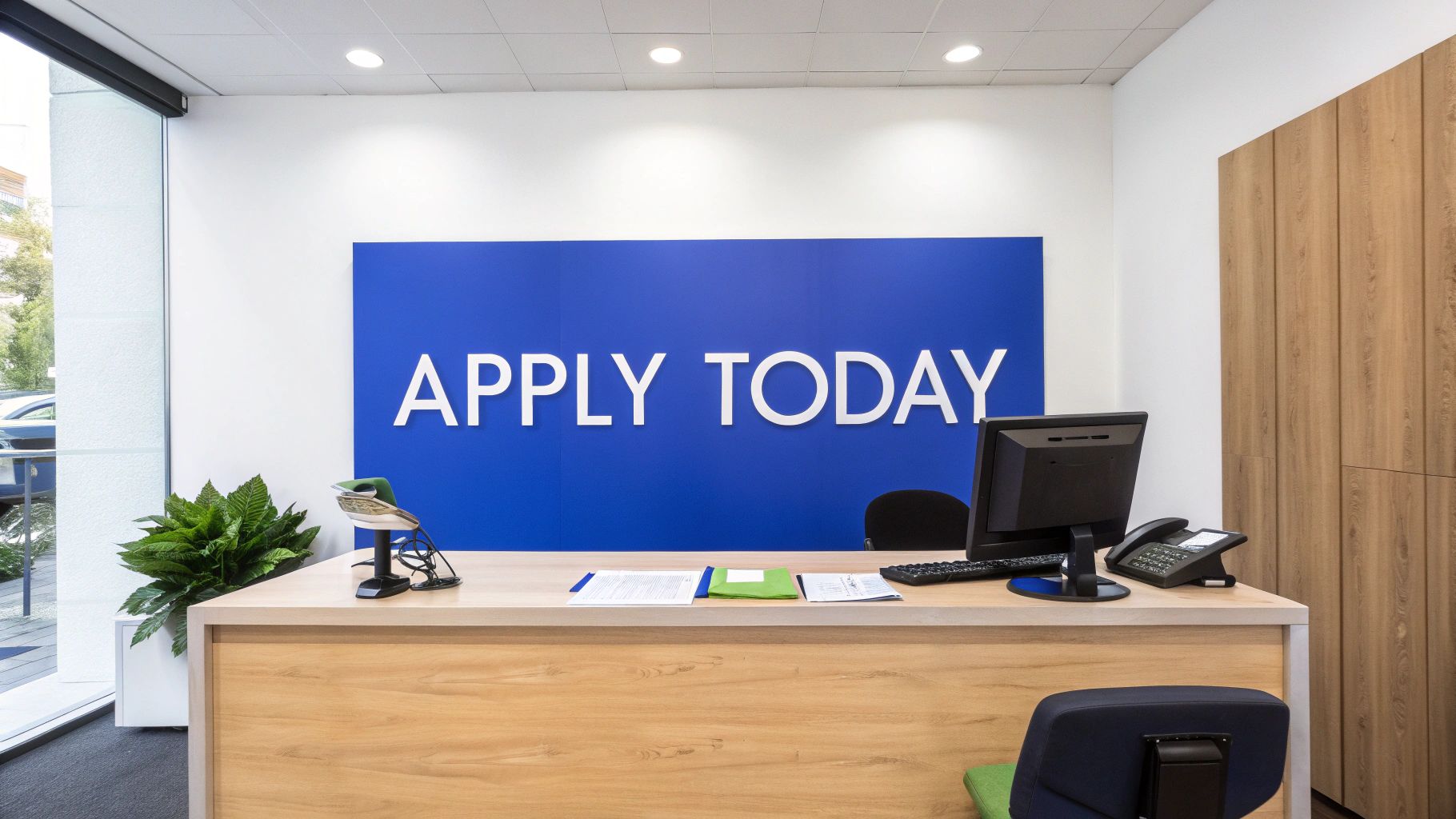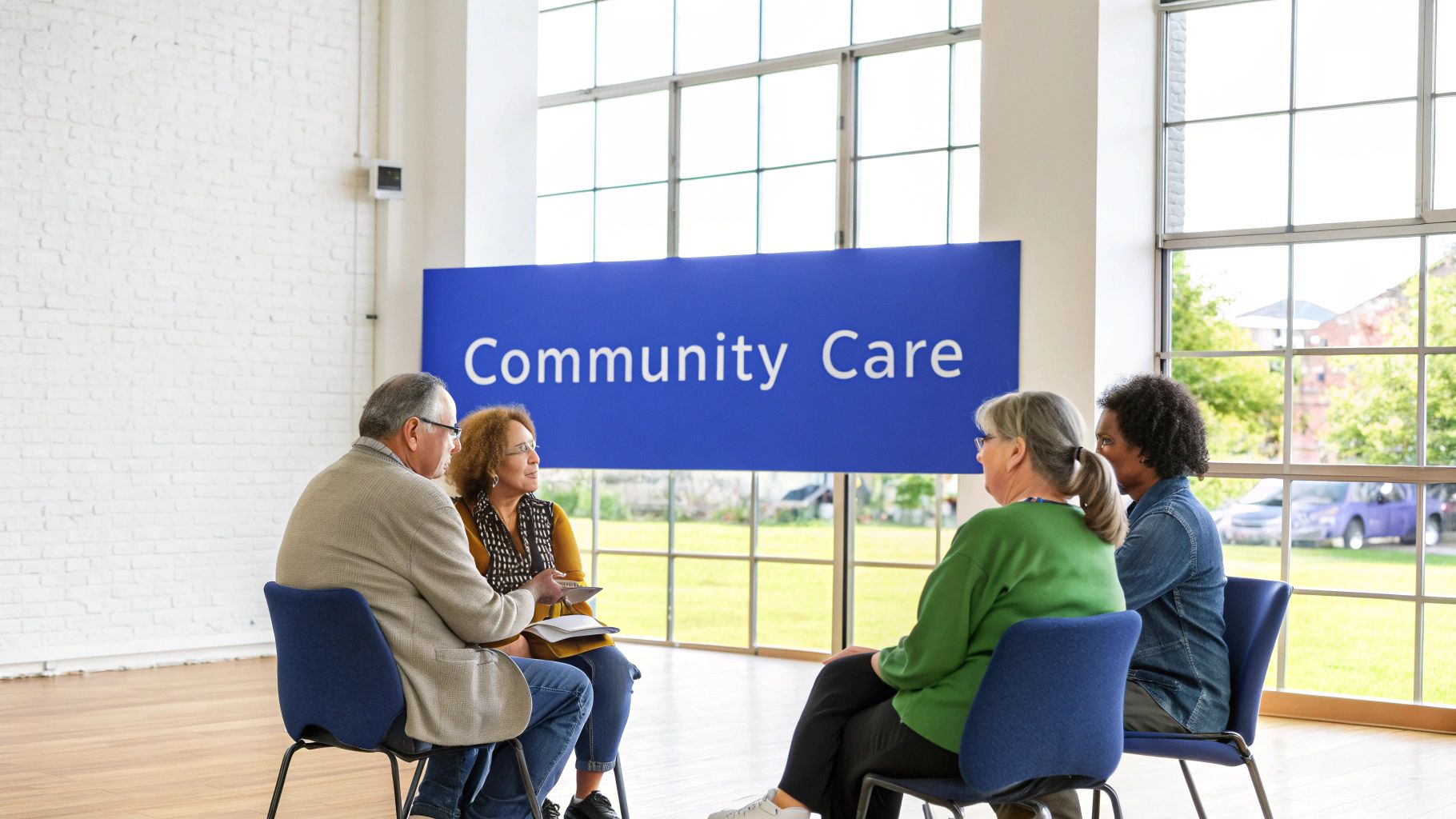Navigating New Jersey Medicaid Waiver Essentials

Understanding New Jersey Medicaid waivers can feel overwhelming. This section simplifies how these waivers offer vital support for vulnerable New Jersey residents. We’ll explore the core differences between waivers and standard Medicaid, highlighting their significant impact on individuals and families.
Distinguishing Waivers from Traditional Medicaid
Traditional Medicaid provides a defined set of benefits, often concentrating on basic medical needs. New Jersey Medicaid waivers broaden these services. They include long-term care supports and services provided within the community.
This key difference allows individuals to receive care at home, promoting independence and better quality of life. This shift from institutional care represents a substantial improvement for those needing extensive support.
For instance, a senior facing mobility challenges could receive in-home help with daily tasks through a waiver program. This avoids the need for a nursing home placement.
The Power of the FamilyCare Comprehensive Demonstration Waiver
New Jersey has simplified its waiver system, mainly through the FamilyCare Comprehensive Demonstration Waiver. This consolidated approach delivers more coordinated and adaptable care.
Rather than navigating numerous waiver programs, individuals access a wider range of services under a single, integrated system. This streamlined process reduces administrative hurdles and ensures access to appropriate support.
This reflects a major change in New Jersey's Medicaid strategy. New Jersey's Medicaid Home and Community-Based Services (HCBS) waivers, previously under Section 1915(c), are now largely within the broader 1115 FamilyCare Comprehensive Demonstration waiver.
This change allows for a more cohesive and efficient service delivery model for long-term care. It prioritizes community-based care over institutionalization. Learn more about New Jersey’s Medicaid Home and Community Based Waivers here. Future NJ Medicaid Waiver programs may be shaped by larger industry trends, as discussed in articles about healthcare staffing trends.
Real-World Impact of Waivers
These waivers reach beyond policy—they significantly affect New Jersey residents' lives. They provide essential support for individuals to stay in their communities, close to family.
This focus on community integration boosts overall well-being and preserves a sense of belonging. These waivers also often provide specialized services not usually covered by standard Medicaid.
Examples include home modifications or assistive technology. This further contributes to independence and a higher quality of life. These programs are essential for families relying on these services to uphold the dignity and independence of their loved ones.
Inside the FamilyCare Comprehensive Demonstration

The five-year extension of New Jersey's FamilyCare Comprehensive Demonstration marks a significant change in how care reaches those who need it. This extension goes beyond a simple policy adjustment; it represents a substantial restructuring of how services are delivered across the state. New Jersey aims to meet healthcare needs often overlooked by traditional coverage through expanded eligibility and new programs.
This means important changes for New Jersey residents. The continuous eligibility provision, for instance, offers a new level of security for beneficiaries. This ensures qualified individuals maintain coverage for a full year, regardless of changes in their income.
The New Jersey Medicaid 1115 Waiver, officially the New Jersey FamilyCare Comprehensive Demonstration, received a five-year extension approved by CMS on March 30, 2023. This extension is effective from April 1, 2023, through June 30, 2028. The waiver includes key programs to broaden coverage, improve eligibility, and address social needs related to health. More detailed information is available here. This extension reinforces New Jersey's dedication to improving both access and quality within its Medicaid services.
A Closer Look at Continuous Eligibility
The 12-month continuous eligibility for adults who qualify based on Modified Adjusted Gross Income (MAGI) is a major component of this extension. It provides much-needed stability and removes the frequent disruptions of eligibility checks.
This stability is a significant improvement, allowing beneficiaries to prioritize their health instead of worrying about potential coverage gaps. This also simplifies administrative tasks, minimizing paperwork and making the system more efficient for everyone involved. The result is a Medicaid system that is both easier to use and more effective.
The following table provides a summary of the key features of the new waiver:
Key Features of NJ FamilyCare Comprehensive Demonstration
This table outlines the major components and innovations introduced in the latest New Jersey Medicaid waiver extension.
| Program Feature | Description | Target Population | Impact |
|---|---|---|---|
| 12-Month Continuous Eligibility | Ensures coverage for a full year, regardless of income fluctuations. | Adults qualifying based on MAGI | Increased stability and reduced administrative burden. |
| Behavioral Health Promoting Interoperability Program (BH PIP) | Integrates behavioral health services with physical health care. | Individuals with behavioral health needs | Improved coordination of care and holistic approach to health. |
| Community Health Workers and Autism Adjunct Services Pilots | Explores innovative service delivery models for community-based support. | Individuals with autism and other specialized needs | Enhanced access to specialized services. |
| Food and Transitional Housing Support | Addresses social determinants of health by providing access to basic needs. | Individuals facing food insecurity and housing instability | Improved overall health and well-being. |
This table highlights the comprehensive nature of the waiver, addressing not just medical needs but also the social factors that impact health. The focus on continuous eligibility, integrated behavioral health, and support for social needs creates a stronger safety net for vulnerable populations.
Specialized Programs Within the Waiver
Beyond continuous eligibility, the waiver incorporates several targeted programs to meet the unique needs of specific groups. These programs aim to fill the gaps in traditional coverage and offer customized support.
- Behavioral Health Promoting Interoperability Program (BH PIP): This program connects behavioral health services with physical health care, acknowledging the important relationship between mental and physical well-being.
- Community Health Workers and Autism Adjunct Services Pilots: These pilot programs test new service delivery models to enhance community support for individuals with autism and other specialized needs.
- Food and Transitional Housing Support: This initiative tackles social determinants of health by ensuring access to fundamental needs like food and housing, which are essential for overall health.
These programs represent a shift in how Medicaid approaches care, focusing on the whole person, not just their medical conditions. This more comprehensive approach aims to improve health outcomes and enhance the quality of life for a wide range of beneficiaries, from older adults aging in place to children with complex medical needs. These programs contribute to a stronger and more supportive healthcare system in New Jersey.
Cracking the Eligibility Code for NJ Medicaid Waivers

Qualifying for a New Jersey Medicaid waiver can feel overwhelming. This section simplifies the process, offering insights gleaned from applicants and eligibility specialists. We'll break down the financial requirements and explain the functional assessments used to determine eligibility for these essential services. Understanding these key components can help determine if you or a loved one qualifies for support.
Financial Eligibility: Income and Asset Limits
Financial eligibility for New Jersey Medicaid waivers hinges on two main factors: income and assets. The specific thresholds for these criteria can differ based on the particular waiver program. For instance, the income limit for one program might be substantially different from another. A clear understanding of these limits is paramount for a successful application.
Income limits are frequently linked to the Federal Poverty Level (FPL), although the exact percentage can change. Asset limits also come into play, restricting the value of possessions such as savings accounts and property (excluding your primary residence). These limits help determine if an individual's financial resources fall within the program's guidelines. Navigating these financial criteria is typically the first step in the application process.
Functional Eligibility: Demonstrating Need
Beyond financial criteria, functional eligibility is a critical factor in determining qualification. This means applicants must show a need for the level of care offered by the waiver program. A functional assessment evaluates an individual's capacity to perform activities of daily living.
This evaluation centers on activities such as bathing, dressing, eating, and managing medications. It aims to determine the level of support an individual needs to live safely at home. The assessment results significantly influence which waiver program someone might qualify for. This process ensures that services are directed to those who truly require them.
To understand how these eligibility criteria differ across various NJ Medicaid Waivers, consult the table below:
Eligibility Criteria Comparison Across NJ Medicaid Waivers
This table compares financial and functional eligibility requirements for major waiver programs in New Jersey.
| Waiver Program | Income Limit | Asset Limit | Functional Requirements | Special Considerations |
|---|---|---|---|---|
| Program A | 150% FPL | $2,000 | Needs assistance with at least 3 ADLs | Priority given to individuals with Alzheimer's |
| Program B | 138% FPL | $2,000 | Needs assistance with at least 2 ADLs | Accepts individuals with intellectual or developmental disabilities |
| Program C | 200% FPL | $3,000 | Needs assistance with at least 1 ADL | Focuses on supporting individuals with physical disabilities |
This table presents a simplified example. Specific requirements for each program may vary. Always consult official program documentation for the most up-to-date information.
Understanding the nuances of each program's eligibility requirements is vital for selecting the most appropriate waiver. It's crucial to remember that these requirements can change, so staying informed is essential.
The 12-Month Continuous Eligibility Provision: Providing Stability
A valuable aspect of the New Jersey Medicaid waiver system is the 12-month continuous eligibility provision. This provision provides much-needed stability for beneficiaries. Once enrolled, individuals are assured coverage for a full year.
This year-long coverage remains in effect even if their income changes. This stability is invaluable for individuals and families facing unpredictable financial situations. It alleviates the stress of frequent eligibility reviews. The 12-month continuous eligibility provision also reduces paperwork and simplifies the process. This consistency fosters better health outcomes by ensuring continued access to necessary care.
Common Misconceptions and Documentation
Many applications face delays or denials due to common misunderstandings about eligibility and insufficient documentation. For instance, some applicants mistakenly think they are ineligible because they own their home. However, primary residences are generally excluded from asset calculations.
Having the required documentation readily available can significantly streamline the application process. Essential documents usually include proof of income, asset statements, and medical records. These records substantiate the information on the application and demonstrate the need for services. Working with a case manager or advocate can be helpful. They can help gather necessary documents and navigate the complexities of the process. This proactive approach can significantly improve the chances of a successful application.
Life-Changing Home Services Through NJ Medicaid Waivers

New Jersey Medicaid waivers offer access to a variety of home and community-based services (HCBS). These services go beyond typical medical care, helping individuals maintain independence and enjoy a better quality of life. Let's explore how these services make a real difference, from personalized care plans to the vital role of service coordinators.
Personalized Care Plans: Tailoring Support to Individual Needs
The journey to receiving HCBS starts with a thorough assessment. This evaluation looks at an individual's medical needs, what they can do on their own, and what they prefer. It's a team effort, involving the individual, their family or caregivers, and healthcare professionals.
This assessment creates the foundation for a personalized care plan. This plan outlines the specific services provided, how often they're delivered, and the goals everyone is working towards. This individualized approach ensures the services truly fit each person's unique situation.
For instance, one person may need help with bathing and dressing, while another might need support with meals and medications. The care plan isn't set in stone; it can change as the individual's needs evolve. This flexibility is key to providing the right support over time.
A Wide Range of Services to Meet Diverse Needs
New Jersey Medicaid waivers cover many different services designed to address various needs, from basic personal care to more specialized support.
-
Personal Care Assistance: This helps with everyday tasks like bathing, dressing, and grooming, so individuals can maintain their hygiene and dignity.
-
Homemaker Services: This provides support with household chores like cleaning, laundry, and cooking, allowing individuals to focus on other things they enjoy.
-
Respite Care: This gives family caregivers a much-needed break while ensuring their loved one receives excellent care.
-
Home Modifications: This includes changes to the home, like ramps or grab bars, to make it safer and easier to get around, preventing falls and reducing the need for hospital stays.
-
Assistive Technology: This offers devices like wheelchairs or communication aids to improve function and independence.
These services, offered by providers like Caring Hands Senior Services, create a supportive home environment that promotes well-being and independence. Caring Hands serves seniors and individuals with disabilities in the Princeton, NJ area, including Mercer County, Hamilton, and the surrounding communities. Learn more about their services at the provided link.
Service Coordinators: Guiding and Supporting Individuals
Service coordinators are essential to the New Jersey Medicaid waiver system. They act as advocates and guides, helping individuals navigate the process of receiving services.
Service coordinators help individuals access the right services, coordinate care, and resolve any challenges that may come up. They are the vital connection between the individual, their family, and the service providers.
They also help individuals communicate any changes in their needs, ensuring the care plan stays up-to-date and effective. This proactive approach is essential for maintaining quality care and promoting long-term well-being. Clear communication ensures individuals receive the support they need to thrive at home.
Integrating Services with Traditional Healthcare
New Jersey Medicaid waivers aren't meant to replace traditional medical care. They work alongside existing medical services to create a more complete and supportive system.
HCBS addresses the non-medical needs that can greatly impact a person's overall health and well-being. For example, help with meal preparation can lead to better nutrition, and home modifications can prevent falls and reduce the need for hospital visits. By integrating HCBS with traditional medical care, New Jersey's Medicaid waiver program aims to improve health outcomes and enhance quality of life for everyone it serves.
The Quality Oversight Challenge in NJ Waiver Programs
Quality care within New Jersey Medicaid waiver programs is a complex issue. It requires ongoing monitoring and accountability. By understanding the perspectives of advocates, regulators, and those receiving services, we can gain a clearer picture of quality management. This section explores how New Jersey monitors providers and the steps taken when standards aren't met. We'll also look at the metrics used to define quality care and how they are tracked.
Monitoring Providers and Enforcement
New Jersey uses various methods to monitor the quality of care provided within its Medicaid waiver program. Regular inspections and audits help ensure providers adhere to guidelines and regulations. Beneficiary feedback and complaints are also actively collected and investigated.
When issues arise, the state takes corrective action. These actions can range from mandatory staff training to financial penalties, depending on the severity of the violation. Effective oversight is key to maintaining high standards of care.
Maintaining consistent quality across different service settings presents a unique challenge. Home-based care, for example, has different monitoring needs than care provided in a facility. The state must adapt its oversight approaches to effectively assess quality across these varied environments. A robust and adaptable monitoring system is essential.
Metrics of Quality: Defining and Tracking What Matters
Defining and measuring quality care goes beyond simply checking for regulatory compliance. It involves examining outcomes that reflect a beneficiary’s well-being. These quality metrics might include fewer hospitalizations, better management of chronic conditions, and increased self-reported quality of life. Tracking these metrics is vital to understanding program effectiveness.
This tracking must occur across diverse service environments. Success metrics for in-home care will naturally differ from those used in a group home. New Jersey must use appropriate metrics for each setting and ensure the data collected is relevant and actionable. This data-driven approach helps ensure the waiver program remains effective.
Many individuals rely on the New Jersey Medicaid Waiver program for long-term care services. Understanding the associated costs is crucial. Long term care insurance cost offers valuable insights into these financial considerations.
New Jersey’s Medicaid funding faces challenges related to quality oversight within its waiver program. A 2023 report found that $614 million in Medicaid funds went to 12 nursing homes consistently receiving the lowest quality ratings over five years. This highlights a serious systemic problem. More detailed statistics are available here. This underscores the need for stronger quality control and enforcement within New Jersey Medicaid waiver programs.
Advocacy and Reporting Concerns: Empowering Beneficiaries
Families often need to advocate for their loved ones when quality concerns arise. Sharing their experiences helps identify systemic issues needing attention. Effective advocacy requires knowing the proper channels for reporting concerns, including who to contact and what information is needed to start an investigation.
Beneficiaries and their families should be aware of warning signs indicating potential quality issues. These can include unexplained injuries, a sudden decline in health, or a noticeable drop in service quality. Recognizing and reporting these warning signs is crucial for protecting vulnerable individuals. This empowers individuals and families to actively participate in ensuring quality care.
Your Step-by-Step Guide to Securing Waiver Services
Applying for a New Jersey Medicaid waiver can feel overwhelming, but with the right approach, it can be manageable. This guide breaks down the process into six key steps, offering insights gleaned from successful applicants and experienced eligibility workers. We'll explore common challenges and valuable resources to help you navigate the New Jersey Medicaid waiver system.
Step 1: Understanding Your Needs and Eligibility
Before starting the application process, take time to assess the specific care needs of yourself or your loved one. This includes evaluating the level of assistance required with daily activities. This understanding will help determine the most appropriate waiver program. Next, review the income and asset limits for the programs you're considering to determine your financial eligibility. For assistance in Mercer County, including Hamilton and Princeton, Caring Hands Senior Services offers guidance on eligibility and available programs.
Step 2: Gathering Essential Documentation
A smooth application process hinges on having the correct documentation. Gather proof of income, asset statements, medical records, and any other documents required by the specific waiver program you're applying for. Organized documentation significantly speeds up the process. For instance, having bank statements readily available streamlines the financial verification step. A complete application package strengthens your overall submission.
Step 3: Completing the Application
Complete the application accurately and thoroughly, providing detailed information about medical history, functional limitations, and care needs. Accuracy is critical. Inconsistencies or missing information can cause delays. If necessary, seek assistance from a case manager or advocate to ensure a complete and error-free application.
Step 4: The Assessment Phase
After submitting the application, anticipate assessments to evaluate the level of care needed. These assessments may include interviews, in-home visits, and medical evaluations. Open communication with assessors is essential. Clearly explain the challenges faced while emphasizing the desire to maintain as much independence as possible.
Step 5: Handling Waitlists and Appeals
Due to high demand, New Jersey Medicaid waiver programs often have waitlists. Be prepared for potential waiting periods and understand the waitlist prioritization process. If your application is denied, don't be discouraged. Familiarize yourself with the appeals process and understand your rights and how to challenge a denial. Advocacy groups or legal aid organizations can provide support during the appeals process.
Step 6: Utilizing Resources and Support
Navigating the waiver system can be complex. Fortunately, many resources offer assistance. The New Jersey Department of Human Services provides information and support. Local Area Agencies on Aging can offer valuable guidance, particularly for seniors. Additionally, advocacy groups specializing in disability rights or long-term care can provide expertise and support. These resources can simplify the process and connect you with appropriate support systems, so don't hesitate to use them for help with applications, assessments, or appeals.
The Evolving Future of NJ Medicaid Waiver Programs
New Jersey's Medicaid waiver system is constantly adapting to the changing needs of its beneficiaries. This dynamic environment presents both exciting opportunities and significant challenges. Let's explore the key forces shaping the future of these vital programs, from emerging care models to technological advancements and persistent systemic issues.
Value-Based Care and Payment Reform
Value-based care models are transforming how healthcare is delivered and paid for. This shift prioritizes positive outcomes and quality of care over the quantity of services provided. For New Jersey Medicaid waivers, this translates to a greater emphasis on preventative care, care coordination, and supporting individuals to remain healthy at home. While this approach promises better health outcomes, it also raises important questions about how these new models will impact access to services and beneficiary choice.
For instance, value-based care may encourage the use of telehealth and remote monitoring for managing chronic conditions. While this can be convenient for many beneficiaries, it may also create barriers for those lacking access to technology or reliable internet service. Finding a balance between innovation and equitable access is crucial for the future success of these programs.
Pilot Programs and Community Integration
New Jersey is actively exploring innovative approaches to community integration through various pilot programs. These programs often test new ways to deliver support services. Some initiatives focus on helping individuals with disabilities find and maintain employment. Others concentrate on providing specialized housing options that promote independence and community living. These innovative pilot programs may hold the key to future program expansion and improvements.
Demographic Shifts and Program Redesign
New Jersey, like much of the US, is experiencing significant demographic changes. The aging population is growing, leading to increased demand for long-term care services provided through Medicaid waivers. Meeting this rising demand will require careful program redesign and investment in workforce development.
This increasing demand will strain both the state budget and the available workforce. Innovative approaches are essential to ensure the long-term sustainability of the Medicaid waiver system.
Technology's Role in Transforming Service Delivery
Technology is rapidly transforming healthcare delivery. Remote monitoring, telehealth, and care coordination platforms offer the potential to improve access to care and enhance service quality. These tools can also help manage costs by reducing hospital readmissions and emergency room visits.
However, integrating technology requires thoughtful planning and execution. Addressing critical issues like digital literacy, data security, and equity of access is essential to ensure that these technologies benefit all beneficiaries.
Addressing Workforce Shortages and Budget Constraints
Despite the opportunities presented by innovation, New Jersey’s Medicaid waiver program faces substantial challenges. Workforce shortages in the healthcare sector make it difficult to recruit and retain qualified caregivers. This can lead to service delays or even denials for individuals in need of support. Developing effective strategies to attract and retain qualified professionals is crucial for the program's long-term viability.
Budget constraints also pose a persistent challenge. Balancing the increasing demand for services with limited resources necessitates difficult decisions about program design and resource allocation. Beneficiaries and their families must actively advocate for funding that supports high-quality care.
By understanding these evolving dynamics and participating in public discussions surrounding Medicaid waivers, individuals and families can help shape the future of these essential programs. Advocating for improvements and holding policymakers accountable is vital to ensure the New Jersey Medicaid waiver system continues to provide essential support for those who rely on it most.
Are you or a loved one in need of compassionate and personalized in-home care in the Princeton, NJ area? Contact Caring Hands Senior Services. We provide a wide range of services, including personal care, nursing services, respite care, and companionship, to help individuals maintain their independence and enjoy a higher quality of life. Learn more about our services and how we can help by visiting our website.


